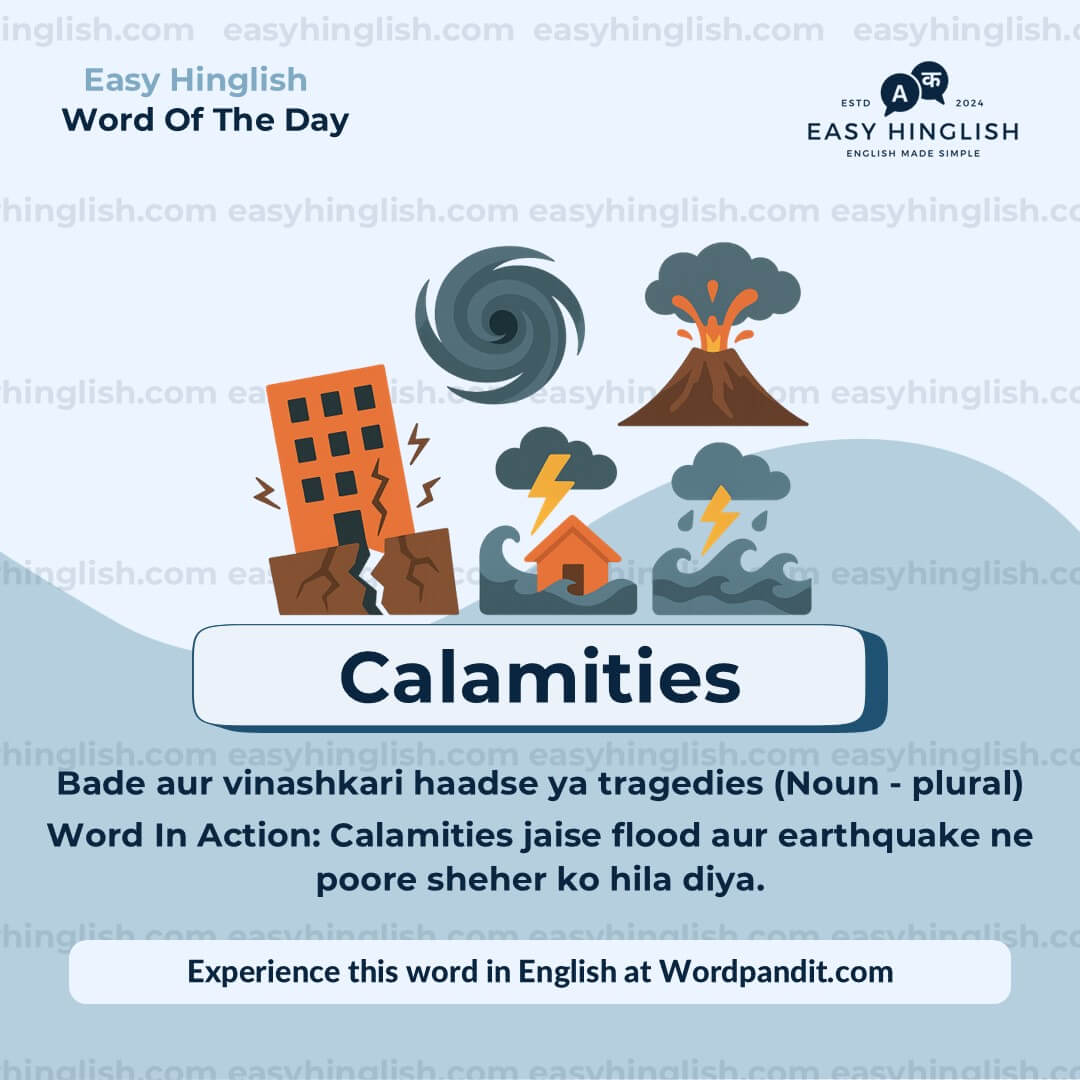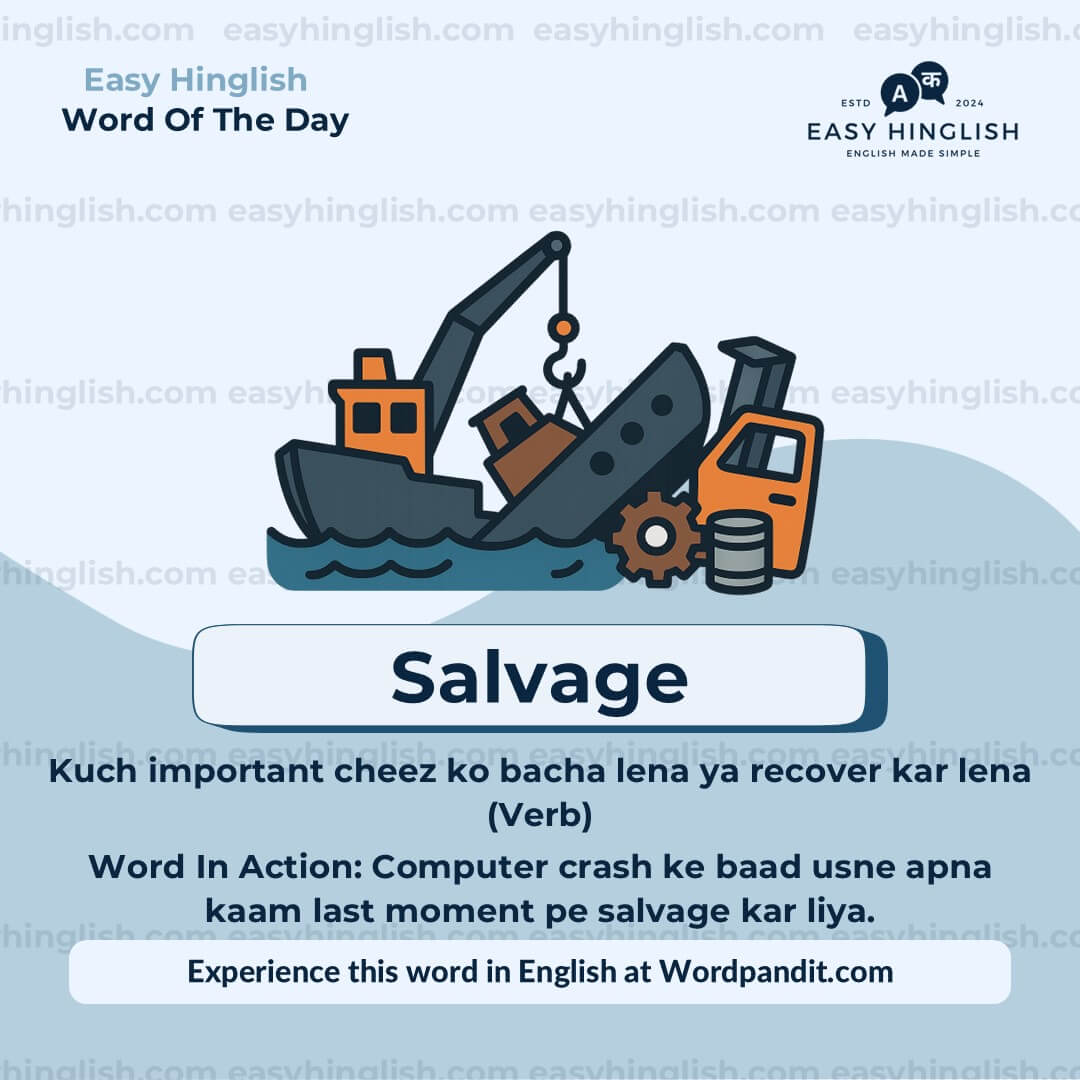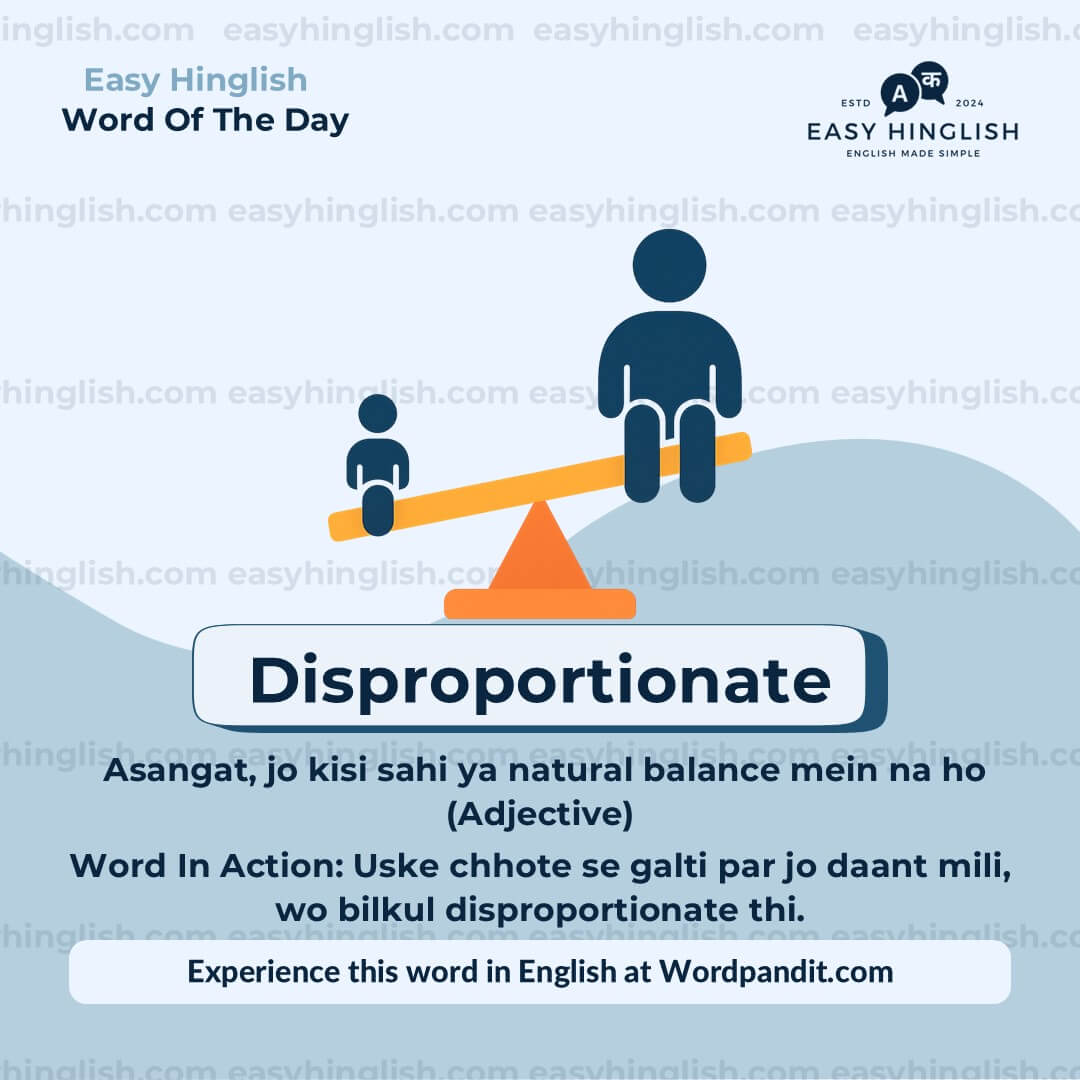Daily Vocabulary Indian Newspapers aur Publications se Seekho
Welcome to Wordpandit ka Indian Vocabulary Hub
Wordpandit par, hum samajhte hain ki ek achhi vocabulary develop karne ke liye local context samajhna bhi zaroori hai. Is section ka focus hai aapke vocabulary ko India ke leading newspapers aur publications se naye shabdon aur phrases ke zariye improve karna, taaki aap practical, relevant, aur uniquely Indian words seekh sakein.
Indian Sources Itne Important Kyun Hain?
Hum maante hain ki kisi bhi language ko sikhne ka sabse best tareeka hai uske local content me immerse hona. Isi wajah se hum carefully words curate karte hain top Indian newspapers aur publications se, jaise:
- The Hindu
- The Times of India
- The Economic Times
- Hindustan Times
- Live Mint
- The Indian Express
- Aur bhi bahut saare...
Hamesha Updated Raho, Hamesha Relevant Raho
Daily updates ke saath, aap Indian news sources se naye words seekhoge jo Indian society aur culture ke latest trends ko reflect karte hain. Hamara focus hai aise words provide karna jo aapke liye real-world me useful ho.
Wordpandit Aapke Learning Goals Ko Kaise Support Karta Hai?
Chahe aap exams ki preparation kar rahe ho, professional communication improve karna chahte ho, ya sirf naye words seekhna chahte ho, Wordpandit har step par aapki madad karega.
Practical Tareeke Se Seekho
Hamari interactive learning methodology me real-world examples, engaging activities, aur context-based usage shamil hain, taaki har naya shabd aapki active vocabulary ka hissa ban sake.
Aaj Hi Indian Vocabulary Seekhna Shuru Karo!
Wordpandit Kyun Choose Karein?
Practical Learning: Aise words seekho jo aapko real-world reading aur communication me sach me kaam aayenge, taaki aapki comprehension aur bolne ki skills improve ho.
Diverse Content: Current affairs se lekar scientific breakthroughs tak, hamare different sources aapko multiple domains ka vocabulary sikhate hain.
Effortless Integration: Wordpandit ko apni daily routine ka part banao. Sirf kuch minute har din dene se aapki vocabulary time ke saath kaafi improve ho sakti hai.
Aapka Vocabulary Mastery Tak Ka Safar
- Regularly hamare Daily Vocabulary section ko visit karo
- Naye words explore karo aur unka context me use samjho
- In words ko apni writing aur bolne ki practice me use karne ki koshish karo
- Jaise-jaise aapke words badhte hain, apni progress ko track karo
Aaj Se Apni Vocabulary Journey Shuru Karo!
Wordpandit ke saath vocabulary improve karna start karo. Roz thoda effort dalne se aap ek strong vocabulary develop kar sakte ho jo academic, professional, aur personal life me kaafi kaam aayegi.
Yaad rakho, ek naya shabd roz seekhna linguistic limitations ko door karne ka best tareeka hai! Wordpandit ko apni daily learning journey ka sathi banao aur vocabulary excellence ki taraf badho!
WORD-1: Stoutly
Sandarbh (Context):
"Unsurprisingly, the three wise men of the re-constituted Commission did not disappoint their mentor. In a year that saw several important polls, they stoutly refused to check hate speech, including the obnoxious." - The Wire
Vyakhya (Explanatory Paragraph):
Stoutly ka matlab hai kisi kaam ko bahut hi firm, strong aur determined tareeke se karna. Jab koi insaan kisi cheez par stoutly khada rehta hai, iska matlab hai ki woh apni baat ya faisle par strongly tikka hua hai, chahe pressure ho ya opposition. Diye gaye context mein, yeh batata hai ki Commission ne hate speech ko rokne se strongly mana kar diya.
Arth (Meaning): Strongly aur firmly, bina hile-dulare (Adverb)
Uccharan (Pronunciation): stowt-lee
Kathinai Star (Difficulty Level): ⭐⭐ (Basic–Intermediate)
Utpatti (Etymology): Middle English stoute se aaya hai jiska matlab hai strong/proud. Yeh Old French estout aur Germanic root "bold/strong" se nikla hai.
Prashant Sir Ke Tathya (Prashant Sir's Notes):
“Stoutly” ko soldier se compare karo jo battlefield mein retreat karne se mana kar deta hai. Yeh word ekdum firm stand ka symbol hai — kabhi yeh bravery hoti hai aur kabhi yeh zidd bhi lag sakti hai.
Samanarthi & Vipritarthi (Synonyms & Antonyms):
Samanarthi (Synonyms): firmly, resolutely, boldly, steadfastly, determinedly
Vipritarthi (Antonyms): weakly, timidly, hesitantly, faintly
Udaharan (Usage Examples):
- Usne apne dost ka stoutly defense kiya jab log uspar blame kar rahe the.
- Gaon walon ne forest cut karne ke plan ko stoutly oppose kiya.
- Woh stoutly declare karta raha ki apna decision woh kabhi change nahi karega.
- Athlete ne injury ke bawajood race ko stoutly complete kiya.
Sanskritik Sandarbh (Cultural Reference):
"She stood stoutly against tyranny, refusing to bend even under pressure." — aise sentences aksar history aur politics mein use hote hain jab kisi ne oppression ke khilaf firm stand liya ho.
Sochiye (Think About It):
Kya hamesha apne beliefs par stoutly tikke rehna achha hota hai? Kab yeh admirable lagta hai aur kab yeh ziddi aur dangerous ho jata hai?
Chhoti Kriya (Quick Activity):
Blank fill kijiye: "He _______ opposed the proposal, even though everyone else supported it." (Hint: aaj ka word use kijiye.)
Yaad Karne Ka Tarika (Memory Tip):
Socho “stout” = strong aur solid. Jab "-ly" add karte ho to iska matlab ho jata hai “strongly or firmly.”
Vastavik Jeevan Me Upyog (Real-World Application):
Aap daily life mein “stoutly” use kar sakte ho jab kisi ne apni baat firm tareeke se boli ho. Example: “Usne stoutly mana kar diya ki woh junk food nahi khayegi diet ke dauraan.”
WORD-2: Calamities
Sandarbh (Context):
"Twenty years after one of the most devastating calamities in history struck south Asia, my memories are as fresh as yesterday." - The Wire
Vyakhya (Explanatory Paragraph):
Calamities un bade tragic events ko bola jata hai jo bahut destruction, suffering aur loss create karte hain. Yeh natural ho sakti hain (jaise earthquake, floods, tsunami) ya man-made (jaise wars, accidents). Diye gaye context mein, writer South Asia ke ek aise tragic event ki baat kar raha hai jiska emotional asar ab tak zinda hai.
Arth (Meaning): Bade disasters ya misfortunes jo bahut damage aur suffering create karein (Noun – plural)
Uccharan (Pronunciation): kuh-LAM-uh-teez
Kathinai Star (Difficulty Level): ⭐⭐ (Basic–Intermediate)
Utpatti (Etymology): Latin calamitas se aya hai jiska matlab hai “damage, disaster,” aur Middle French calamité ke through English mein aaya.
Prashant Sir Ke Tathya (Prashant Sir's Notes):
Calamities ko hamesha bade scale ke misfortunes ke liye use karte hain jo ek community ya society ko ek saath impact karte hain. Yeh personal problem ke liye use nahi hota. Iska tone heavy aur serious hota hai.
Samanarthi & Vipritarthi (Synonyms & Antonyms):
Samanarthi (Synonyms): disasters, catastrophes, tragedies, misfortunes, afflictions
Vipritarthi (Antonyms): blessings, miracles, fortunes, prosperity
Udaharan (Usage Examples):
- Earthquake aur floods desh ki sabse badi calamities mein se the.
- History hamesha calamities se bhari rahi hai jo civilizations ko badal deti hain.
- Pandemic ne families aur businesses ke liye unexpected calamities laayi.
- Calamities ke bawajood, logon ne milkar courage aur unity dikhayi.
Sanskritik Sandarbh (Cultural Reference):
2004 Indian Ocean tsunami ko modern era ki sabse badi calamities mana jata hai, jisme millions log multiple countries mein affected hue the.
Sochiye (Think About It):
Kya calamities hamesha sirf destruction laati hain? Ya kabhi-kabhi yeh unity, innovation aur social change ka bhi source ban sakti hain?
Chhoti Kriya (Quick Activity):
Tin historical calamities (natural ya man-made) likhiye jo duniya ka course badal chuki hain. Har ek par ek sentence likhiye ki usne logon ki life ko kaise impact kiya.
Yaad Karne Ka Tarika (Memory Tip):
Socho ek giant squid (calamari) city mein attack karke chaos create kar raha hai — bas aise yaad rakho calamity = bada disaster.
Vastavik Jeevan Me Upyog (Real-World Application):
“Calamities” word aksar news reports, history books aur humanitarian discussions mein use hota hai jab large-scale tragedy ki baat hoti hai. Yeh word aapko global events ko samajhne aur unke impact ko describe karne mein madad karta hai.
WORD-3: Enthrall
Sandarbh (Context):
"As a year that saw the Adanis and Ambanis capture disproportionate media space by employing the ancient Roman principle, panem et circenses, or bread and circuses, to enthrall the paparazzi and pauper alike." - The Wire
Vyakhya (Explanatory Paragraph):
Enthrall ka matlab hai kisi ko poori tarah se fascinate karna, captivate karna ya spellbound kar dena. Jab koi insaan enthrall ho jata hai, toh woh itna engage ho jata hai ki apna aas-paas bhool jata hai. Originally iska matlab tha “enslave karna,” lekin ab iska sense zyada “captivate” hone ke liye use hota hai. Context mein, yeh batata hai ki kaise glam aur entertainment ne rich aur poor dono ka dhyaan kheench liya.
Arth (Meaning): Kisi ka dhyaan poori tarah attract karna aur engage karna (Verb)
Uccharan (Pronunciation): en-THRAWL
Kathinai Star (Difficulty Level): ⭐⭐⭐ (Intermediate)
Utpatti (Etymology): Old English thrall se aya hai jiska matlab hai “slave.” Pehle iska sense tha enslave karna, baad mein evolve hoke fascination aur captivation ka ho gaya.
Prashant Sir Ke Tathya (Prashant Sir's Notes):
“Enthrall” ka matlab hai kisi cheez mein itna kho jana ki baki duniya bhool jayein. Ye word aksar stories, performances ya leaders ke speeches ke liye use hota hai jo logon ko trance jaisa feel karate hain.
Samanarthi & Vipritarthi (Synonyms & Antonyms):
Samanarthi (Synonyms): captivate, mesmerize, fascinate, enchant, bewitch
Vipritarthi (Antonyms): bore, repel, disinterest, disgust
Udaharan (Usage Examples):
- Magician ke tricks ne bachchon ko poori tarah enthrall kar diya.
- Uski storytelling ability family gatherings mein sabko enthrall kar deti hai.
- Mountains ki breathtaking scenery ne travelers ko enthrall kar liya.
- Leader ki speech ne crowd ko enthrall karke complete silence mein sunaaya.
Sanskritik Sandarbh (Cultural Reference):
Shakespeare ke plays audience ko enthrall karne ke liye likhe gaye the, aur is wajah se woh aaj bhi centuries baad equally engaging lagte hain.
Sochiye (Think About It):
Kya hamesha enthralled rehna positive hota hai? Ya kabhi-kabhi yeh logon ko reality se blind bhi kar sakta hai, jaise propaganda ya manipulation?
Chhoti Kriya (Quick Activity):
Do lines mein likhiye ki recently kaunsa book, movie, ya place aapko enthrall kar gaya.
Yaad Karne Ka Tarika (Memory Tip):
Socho “in-thrall” = kisi ke spell ke under. Matlab enthrall = kisi cheez ke magic mein poori tarah bandhna.
Vastavik Jeevan Me Upyog (Real-World Application):
Aap “enthrall” word use kar sakte ho jab koi cheez aapko poori tarah fascinate ya captivate kare — jaise ek movie, ek leader ki speech, ek natural view, ya ek gripping novel.
WORD-4: Salvage
Sandarbh (Context):
"An old fisherwoman shouted at me to run as she herself ran barefoot, clutching a small bundle of clothes, the little relief she had managed to salvage of her life." - The Wire
Vyakhya (Explanatory Paragraph):
Salvage ka matlab hai kisi cheez ko loss, damage ya destruction se bachana. Yeh aksar disasters ke context mein use hota hai, jaise flood, fire, accident, jahan log jo bacha sakte hain, bacha lete hain. Diye gaye sentence mein fisherwoman ne apne kapde ka ek bundle bachaya — jo uske liye life ke kuch hisson ko preserve karne jaisa tha.
Arth (Meaning): Kisi cheez ko damage ya loss se rescue karna ya bachana (Verb); jo bacha liya gaya ho (Noun)
Uccharan (Pronunciation): SAL-vij
Kathinai Star (Difficulty Level): ⭐⭐ (Basic–Intermediate)
Utpatti (Etymology): Old French salver se aaya hai (“to save”), jo Latin salvare (“to make safe”) se nikla. Pehle isko ships aur cargo ko bachane ke context mein use kiya jata tha.
Prashant Sir Ke Tathya (Prashant Sir's Notes):
“Salvage” ko yaad rakho as “save from wreckage.” Chahe fire se cheezein bachaana ho, scandal se apni reputation bachani ho, ya waqt waste hone se bachana ho — iska basic sense hamesha hai kisi value ko loss se rescue karna.
Samanarthi & Vipritarthi (Synonyms & Antonyms):
Samanarthi (Synonyms): rescue, recover, retrieve, save, reclaim
Vipritarthi (Antonyms): abandon, lose, destroy, forfeit
Udaharan (Usage Examples):
- Firefighters ne burning office se important documents salvage kiye.
- Usne public apology dekar apni reputation salvage karne ki koshish ki.
- Company ne purane machines se parts salvage karke naye projects mein use kiya.
- Defeat ke bawajood, team ne ek late goal karke apni pride salvage ki.
Sanskritik Sandarbh (Cultural Reference):
World War II ke time, “salvage operations” common the jahan log scrap metal, rubber aur materials collect karke war effort ko support karte the.
Sochiye (Think About It):
Kya kabhi pride, dignity ya reputation ko salvage karna utna hi important hota hai jitna material possessions ko bachana?
Chhoti Kriya (Quick Activity):
Blank fill kijiye: “After the storm, the family worked together to _______ what was left of their home.”
Yaad Karne Ka Tarika (Memory Tip):
“Salvage” aur “Save” dono “sa-” se start hote hain. Bas yaad rakho salvage = save from damage.
Vastavik Jeevan Me Upyog (Real-World Application):
“Salvage” word disasters, accidents, aur recycling industry mein bahut use hota hai. Daily life mein bhi log apna time, effort, ya reputation salvage karne ki baat karte hain.
WORD-5: Disproportionate
Sandarbh (Context):
"As a year that saw the Adanis and Ambanis capture disproportionate media space by employing the ancient Roman principle, panem et circenses, or bread and circuses, to enthrall the paparazzi and pauper alike." - The Wire
Vyakhya (Explanatory Paragraph):
Disproportionate ka matlab hai jab koi cheez balance mein na ho ya kisi aur cheez ke comparison mein zyada ya kam ho. Yeh imbalance ko dikhata hai. Context mein iska use batata hai ki kuch business families ko media mein utna zyada coverage mila jitna fair ya justified nahi tha, matlab disproportionate tha.
Arth (Meaning): Zyada ya kam hona comparison ke hisaab se; imbalance (Adjective)
Uccharan (Pronunciation): dis-pro-POHR-shuh-nit
Kathinai Star (Difficulty Level): ⭐⭐ (Basic–Intermediate)
Utpatti (Etymology): Latin se aya: dis- (not) + proportio (proportion, balance). Matlab literally “not in proportion.”
Prashant Sir Ke Tathya (Prashant Sir's Notes):
“Disproportionate” imbalance ko highlight karta hai. Chahe woh punishment ho, wealth distribution ho, ya media coverage. Word law, economics aur journalism mein bahut common hai. Iska use unfair ya extreme comparisons dikhane ke liye hota hai.
Samanarthi & Vipritarthi (Synonyms & Antonyms):
Samanarthi (Synonyms): excessive, uneven, imbalanced, unequal, overblown
Vipritarthi (Antonyms): balanced, fair, equal, proportionate, moderate
Udaharan (Usage Examples):
- Uski galti chhoti thi, lekin punishment disproportionate tha.
- Ek chhoti si news ko media ne disproportionate coverage diya.
- City mein wealth ka distribution disproportionate hai — kuch log bohot rich hain aur baaki bohot gareeb.
- Exam ka darr disproportionate tha compared to actual difficulty.
Sanskritik Sandarbh (Cultural Reference):
Politics aur wars mein “disproportionate force” ka concept bahut common hai, jahan ek taraf se power ka extreme use hota hai dusri taraf ke comparison mein.
Sochiye (Think About It):
Aapko lagta hai society mein sabse zyada disproportionate distribution kahan hai — wealth, opportunities ya media attention? Aur kyun?
Chhoti Kriya (Quick Activity):
Apni life se ek sentence likhiye jahan aap “disproportionate” use kar sakte ho (jaise study time vs. leisure time).
Yaad Karne Ka Tarika (Memory Tip):
Socho ek weighing scale jisme ek taraf zyada bhaari hai aur dusri taraf halka. Yeh hi hai “dis + proportionate” = imbalance.
Vastavik Jeevan Me Upyog (Real-World Application):
Disproportionate word ko law (disproportionate punishment), economics (disproportionate wealth gap), aur media (disproportionate coverage) mein bahut use kiya jata hai. Yeh unfair imbalance ko describe karne ke liye perfect hai.













